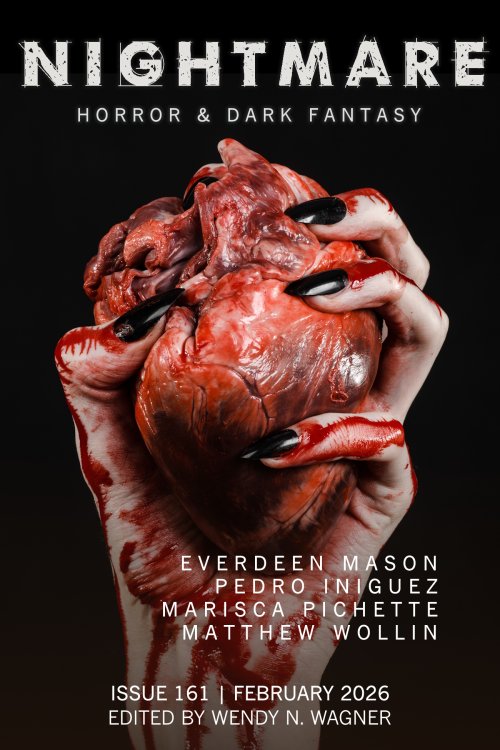“She Sheds Her Skin” is an eerie, fascinating look at relationships and what we sacrifice for them. What was the inspiration behind it, and what was your writing process like?
I initially wrote this story during the lockdown in 2020. It began with an image—Cora’s empty skin—and a feeling—exasperation. From there, I started to flesh out the story of this relationship that, despite all of the fantastic and gory aspects, was failing for completely ordinary reasons. During the lockdown, I was hearing from friends about how the forced (and constant) togetherness was impacting the way they cohabitated with their significant others, and those feelings influenced the story. Our narrator and Cora aren’t bound together by a lockdown, but the secret truth of Cora’s nature has shut out the outside world all the same.
The story emerged more or less fully formed. An early draft had an explanation of how the narrator and Cora met, and included a more explicit origin story for Cora, but I knew almost immediately that the heart of the story was in the claustrophobia of coming in at the end of things; the beginning wasn’t important.
This is a story about toxic relationships, and the roles that each person plays in it. What made you focus on this theme, and how did the idea of an immortal, skin-changing creature play into the story’s overall design?
Shape-changers exist in myth and legend all over the world, and, to me, there’s something inherently tragic about them. I think Ovid’s Metamorphoses in particular thinks about the idea of willing and unwilling shape change—Zeus changes shape like pulling on a pair of trousers, but mortals like Narcissus and Actaeon don’t have a choice in the matter, and their metamorphoses are irreversible. Cora, I think, is an unlucky combination of the two. At some point in the past she was able to change in a godlike way, and now she’s aged into a shadow of her former power, doomed to carry the memory of how it used to be with her forever. In spite of the fact that she now murders people to assume their form, I have a lot of sympathy for her. An immortal past seems like a lot to carry. When we enter into relationships with people, we’re entering into all they carry with them; for our narrator, the scale of Cora’s past means dealing with so much more than an average mortal relationship, and I wanted to explore how that could be both mundane and mythological in scope.
The narrator isn’t all that different from Cora, in the sense that they are changing their skin as well. Granted, it’s maybe not in such a violent way as the way Cora does it, but it’s still violent to those that change themselves to fit relationships. Why do you think your narrator chooses to stay in a relationship that doesn’t fulfill their needs, that doesn’t feel equitable for them?
This is the question of the piece, and one I hope readers will want to sit with. Ultimately, there are many reasons the narrator might stay—love, fear, memory, hope, inertia, a longing for something magical . . . all or none of those reasons and a thousand more besides. What I hope most resonates with readers is that neither the narrator nor Cora are truly the villain in their relationship, or truly wrong. But they are wrong for one another, no matter how they try to change their skins.
Do you have any other projects coming out that you’d like to talk about? What’s next for you?
My first ever published story, an homage to the cursed book collectors of Lovecraft, will be reprinted in the upcoming Strange Aeon 2024 anthology. In the meantime, I have a few projects in the works, including a longer-form story set in 1990s Tennessee that explores the intersection of queer awakenings and apocalyptic horror.









